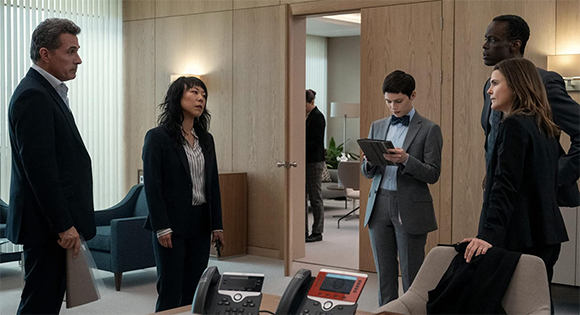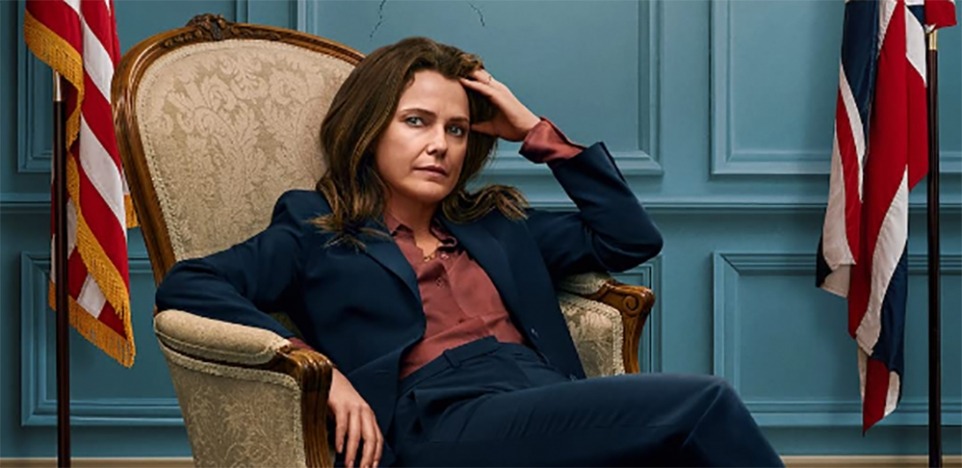We are living in a time when filmmakers all around the world are creating stories drenched in blood and gore. Murder mysteries fill the screen every night, streaming death and destruction into our bodies, minds, and souls. We have grown used to the twisted portraits of mass-murderers and freakish family members who find clever ways of avoiding capture. With so much crime afoot, it is no wonder that cops, detectives, FBI agents, and zealous believers in law and order are paraded in front of us as heroes. They seem to be willing to do all they can to keep us safe in our gun-ridden nation.
Five months into a new year and the film industry has not changed its tune. We are being fed more of the same violent, exaggerated, and depressing tales designed to scare and shake us up. But one show has taken a different tack. In it, the one keeping us safe is in the State Department, not the police station.

Netflix’s The Diplomat is a bold, creative, and imaginative eight-part political drama created by Debora Cahn (“The West Wing,” “Homeland”). . Keri Russell gives a nuanced and ethically rich performance as Kate Wyler, a career U.S. foreign service officer who is looking forward to becoming the ambassador to Afghanistan. But after the surprise bombing of a British aircraft carrier off the coast of India, she is assigned to be the ambassador to the United Kingdom. Someone with her experience is needed as diplomats and politicians are on high alert in England, Iran, Russia, France, and the United States. Her situation becomes even more complicated when she learns that the U.S. Vice President is about to resign due to a scandal, and she is on the short list to be appointed the Vice President.
Kate is a very independent thinker fully capable of making the tough political and diplomatic assessments needed in this situation. But she is surrounded by male advisors including her husband Hal (Rufus Sewell), himself a former ambassador whose charisma and political savvy sometimes benefits his wife and, at other times, undermines her authority and decisions. Her chief of staff and England’s foreign secretary also try to guide Kate when the Prime Minister’s Two black advisors try to guide Kate while the authoritarian Prime Minister’s (Rory Kinnear) fiery brand of patriotism blames Iran for the attack, dismissing Kate’s conclusions.
So, amid all the political and diplomatic maneuvering, Kate must deal with mysogyny and expectations that a woman diplomat’s first concern should be her clothing and appearance. This is true for women in other professions, who will find themselves cheering for Kate as she not only protects the world from war but stands up for her gender.
Going Deeper
Viewing The Diplomat gives us a chance to examine the lives of others through nonfictional and fictional biopictures. Two other films are recommended for the same reasons:
Thirteen Days delves into the political, psychological, and social tension during the 1962 Cuban Missile Crisis and the power struggle between President John Kennedy and his brother Bobby and the Joint Chiefs of Staff.
The Iron Lady stars Meryl Streep as Margaret Thatcher, the Prime Minister of England, revealing how her refusal to compromise trashed a nation.
This type of story gives us a context in which to see how politically motivated individuals deal with change, love and loss, success and failure, suffering and death.
They identify the moral patterns and turning points that give value and meaning to life.
They enable us to recognize the elements in ourselves that govern our choices.
They increase our appreciation of the irrational aspects of our behavior and give us glimpses of our shadow sides.
They enhance our awareness of the ambiguity of human relationships.
They help us become more cognizant of human differences and similarities.
They inspire us to bring peace and justice to our world.
